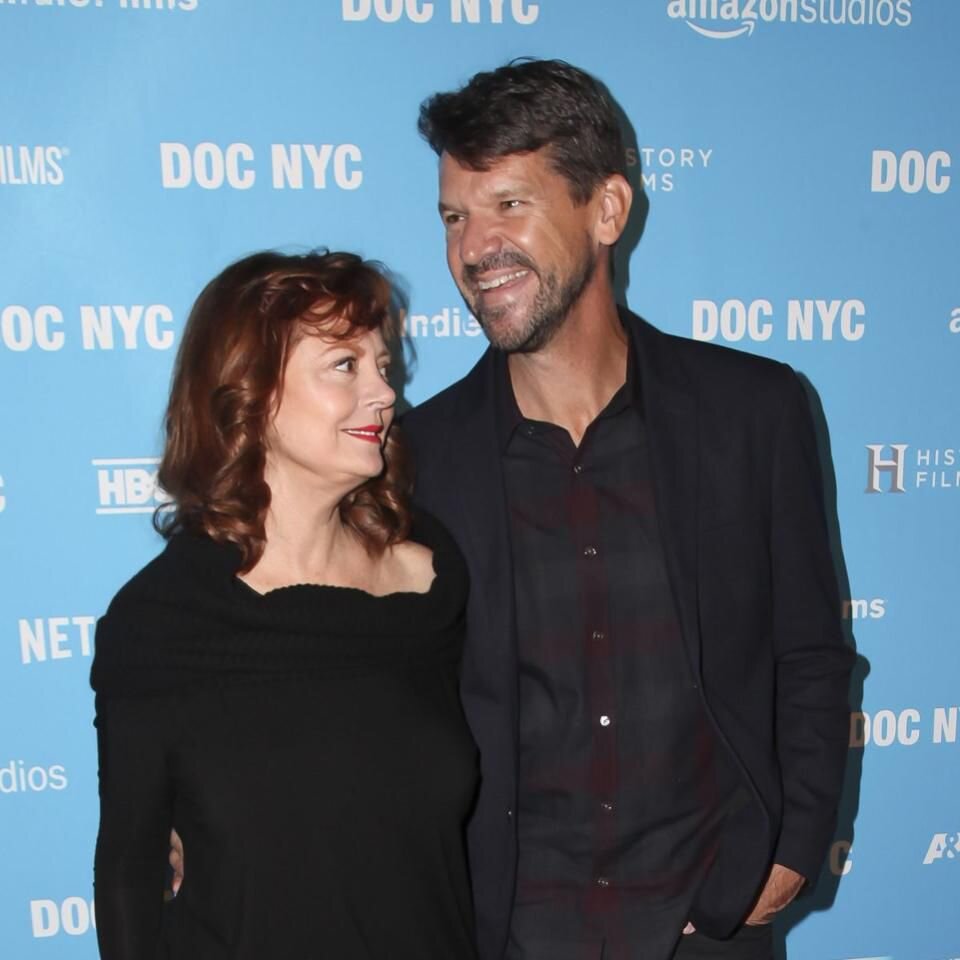
Executive Producer Susan Sarandon and Director Thomas Morgan, who frequently work together on documentary films, at the premier of Soufra at the DOC NYC Film Festival. Credit: Patrick McMullan
Thomas Morgan looked across the room in a skyscraper in Charlotte, N.C., at a suited executive for a big Southern Energy company. He was shocked at the ruthless deal on the table: A North Carolina farmer would be forced to sell land for pennies on the dollar, so the company could build a solar array.
“You can’t do that,” Morgan remembers saying.
“Yeah, you might be in the wrong business,” the executive said.
“‘Yeah, I think I am,” Morgan said to himself. “I think I’m in the wrong business.”
Eight years later, he has become one of a new generation of documentary filmmakers who combine activism with documentaries. Last fall, the studio he founded, Rebelhouse, released Soufra, a film about a Palestinian entrepreneur in a long-standing refugee camp in Lebanon; the film was executive produced by Susan Sarandon. He's also been able to bring attention to the issue of homelessness, and raise more than a $1 million for children in Nepal.
Along with helping to produce his own films, the studio provides $10,000 - $15,000 in seed funding to filmmakers, and helps them raise more in exchange for 20-50% ownership of the film.
The story of how he made the transition from finance to film is a tale of courage, and support from people around him, and even some relative strangers.
Back in 2010, his job in green finance had enabled him to buy a big house in Charlotte, N.C. He had four great kids. His wife had given him a TAG watch for his 40th birthday. True, he’d written a couple of screenplays, one that had been made into a lackluster indie film, and one he felt passionate about, on homelessness, that had been read professionally by actors. But still – what choice did he have but to plug away?
A few months later, he went up to New York on business, to meet automotive entrepreneur Malcolm Bricklin. They connected right away. At their second meeting Bricklin looked at him and said, “Son, you’re in the wrong place. You seem like someone who wants to be making the world better.”
Morgan flew back home and asked his wife what she’d think if he quit his job to make films – specifically, documentaries, that could shed light on social issues. She offered to go back to work, in marketing, and said something like this: “How are you going to tell our kids to chase their dreams if you're not willing to chase yours?"
That was in 2010. Morgan has gone on to become an independent filmmaker with his own studio, Rebelhouse, in partnership with another writer/producer, Trevor Hall. Storied Streets, his film about homelessness, was shown on college campuses across the county and led to lobbying in Congress on the issue. Morgan also directed Waiting for Mamu, enabling him to raise $1.4 million for The Butterfly House, a shelter for children freed from prison in Nepal. He is also the executive producer of Silenced, a film about government whistleblowers, and India’s Daughter, about the rape and murder of a 23-year old medical student.
One of the keys to Morgan’s transformation from banker to filmmaker was the validation he got from Bricklin. “I still do look for this acceptance, you know?” He pauses. “Validation. It took me a long time to admit that.”
For his part, Bricklin says he’s always been good at giving validation. “I have a sense of when people are ready to change,” he said.
His Sister’s Murder
The other key to his courage, Morgan believes, was his sister’s death. In 1994, his younger sister was murdered while she was in college at Francis Marion University, a crime that was never solved. His desire for closure led to his first attempts at writing.
When it occurred to him that he might give up the banking life for one he felt more honest in, he felt his sister’s presence. “This sounds so hokey, but it’s like my sister had come back to me. … She would have said: Who gives a shit? Who cares what they think?”
Building the business hasn’t been easy: At one point, during his first film, he found himself short of $50,000. He’d sold that TAG watch and was slowly tapping his retirement accounts – when a friend in Charlotte heard his story and stepped up, with a loan so he could complete Storied Streets.
He and his family now live an itinerant lifestyle, traveling to make his films, though he says they will settle down soon. The reward for his new life? He’s now able to answer the question: “Who am I?” in a way that makes sense to him.
Advice for other people thinking about starting a business to follow their dreams: “I was really lucky to find the right people and find the right support and have my wife be so supportive of this crazy idea that I had. But, I tell my kids all the time, just chase your dream. Just chase after it as hard as you can, and who knows where you end up? It's not going to be perfect. It's probably going to be better than what you thought perfect was.”
Turning points he expects in the next year: “I am really intrigued by stories of strong women and right now am drawn to the Middle East again – there is so much there. … Once you have given it all up to start over and you have survived - it's freeing. Your fear dissipates when you think of change. I can see scripted work in my future - still meaningful just a different way of telling the story but you truly never know.”
